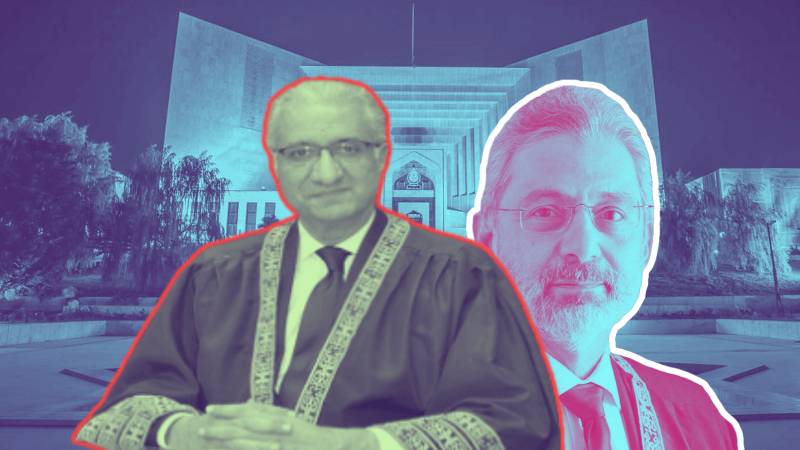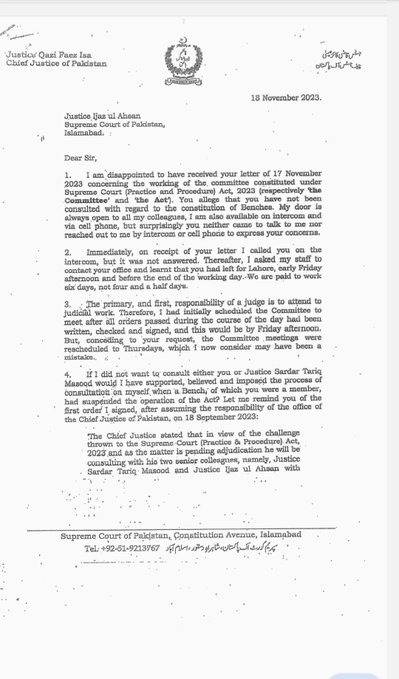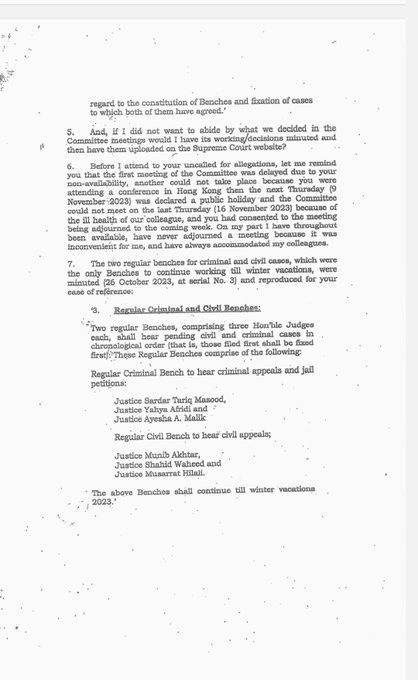
A day after Justice Ijazul Ahsan wrote a terse letter to the Supreme Court Registrar claiming that two benches were not formed without following the set procedure to form benches and for publishing 'incorrect' minutes of meetings without getting his signatures, a letter emerged on Tuesday from Chief Justice Qazi Faez Isa responding to past, 'uncalled for allegations' from Justice Ahsan and calling him out on his conduct.
The emergence of the letter, however, has confirmed a continuing discord between judges of the apex court, with their exchange of barbs making their way into the public domain.
Chief Justice Isa's letter, which emerged on Tuesday, was dated November 18 and referred to a letter written by Justice Ahsan on November 17, in which he had allegedly also expressed concerns regarding the working of the committee constituted under the Supreme Court (Practice and Procedure) Act 2023.
"You allege that you have not been consulted with regard to the constitution of benches," CJP Isa wrote, expressing his disappointment over Justice Ahsan's complaint of not being consulted but wondered why the senior judge did not directly contact him if the matter bothered him so.
"My door is always open to all my colleagues. I am also available on the intercom and via cell phone, but surprisingly, you neither came to talk to me nor reached out to me by intercom or cellphone to express your concerns."
CJP Isa added that as soon as he received Justice Ahsan's letter, he tried to reach out to him via the intercom.
"I called you on the intercom, but it was not answered. Thereafter, I asked my staff to contact your office and learnt that you had left for Lahore early Friday afternoon and before the end of the working day," CJP Isa wrote.
"We are paid to work six days, not four and a half days."
CJP Isa did not mention whether he made any efforts to contact Justice Ahsan via cell phone on November 18 after having tried him on the intercom.
Chief Justice Isa continued that the primary responsibility of a judge is to attend to their judicial work.
"I had initially scheduled the committee to meet after all orders passed during the course of the day had been written, checked and signed, and this would be by Friday afternoon," he explained the late hour to schedule the meeting.
"But, conceding to your request, the committee meetings were rescheduled to Thursdays, which I now consider may have been a mistake," he wrote.
The chief justice dispelled the notion that he had no desire to consult the other two judges of the committee to form benches, he would not have agreed to form the committee.
"If I did not want to consult either you or (senior puisne) Justice Sardar Tariq Masood, would I have supported, believed and imposed the process of consultation on myself when a bench, of which you were a member, had suspended the operation of the Act?"
CJP Isa went on to remind Justice Ahsan of the first order he had signed after assuming responsibility as the Chief Justice of Pakistan on September 18 2023:
"The Chief Justice stated that in view of the challenge thrown to the Supreme Court (Practice & Procedure) Act, 2023 and as the matter is pending adjudication, he will be consulting with his two senior colleagues, namely, Justice Sardar Tariq Masood and Justice Ijaz ul Ahsan with regard to the constitution of Benches and fixation of cases to which both of them have agreed."
CJP Isa continued to reiterate his commitment to the bench-making mechanism, noting that "if he did not want to abide by what we decided in the committee meetings, would I have its working/decisions minuted and then have them uploaded on the Supreme Court website?"
Terming Justice Ahsan's allegations as "uncalled for", the chief justice narrated a sequence of events where the first meeting of the committee had to be put off.
"Let me remind you that the first meeting of the committee was delayed due to your non-availability, another could not take place because you were attending a conference in Hong Kong, then the next Thursday (November 9, 2023) was declared a public holiday and the committee could not meet on the last Thursday (November 16, 2023) because of the ill health of our colleague [Justice Masood], and you had consented to the meeting being adjourned to the coming week (November 23, 2023)," he said.
"On my part I have throughout been available, have never adjourned a meeting because it was inconvenient for me, and have always accommodated my colleagues," CJP Isa stated.
The letter then mentions that two regular benches will be working through the court's annual two-week-long winter vacations towards the end of December and the beginning of January. These benches will hear criminal and civil cases. The formation of these benches was minuted on October 26, 2023.
The two benches will be comprised of three judges each and will hear pending civil and criminal cases in chronological order (those filed first shall be fixed first)
The letter listed the composition of the benches as:
- Regular criminal bench to hear criminal appeals and jail petitions:
Justice Sardar Tariq Masood,
Justice Yahya Afridi and
Justice Ayesha A. Malik
Regular Civil Bench to hear civil appeals:
- Justice Munib Akhtar,
Justice Shahid Waheed and
Justice Musarrat Hilali.


Justice Ahsan's letter
Chief Justice Isa's letter from last month emerged a day after Justice Ahsan wrote a letter complaining that two special benches to hear an appeal against the SC's verdict on the trial of civilians in military courts and a petition by Justice Mazahar Ali Akbar Naqvi, were notified by the top court which was never put before the three-member committee on deciding benches to finalise.
"The two special Benches have not been constituted by the Committee. The same were never placed before the Committee in its meeting," Justice Ahsan stated in his letter.
"Further, as agreed in the meeting, a seven (07) member bench has not been constituted - instead, a six (06) member bench has been notified."
Justice Ahsan, in his letter, further claimed that the minutes of the committee's meeting were published without being confirmed by him as a participant of the meeting.
Lawyers react
Reacting to Justice Ahsan's letter of December 11, some lawyers agreed with his arguments regarding the formation of a six-member bench, headed by Justice Sardar Tariq Masood, to hear appeals against the top court's military court verdict.
They said that the matter shall remain ambiguous if the bench decides the appeal with an opinion evenly split.
Regarding Justice Masood's opinion on the military courts case and Justice (retired) Jawwad S. Khawaja's objection, legal experts were of the view that the question of maintainability of these petitions was decided before a judgment was passed. But since appeals have been filed on it, it invokes another jurisdiction.
They further said that Justice (retd) Khawaja's objection against Justice Masood lacks solid reasoning, adding that it is up to the judge as to whether he recuses himself from a bench or not.
On the other hand, Justice Ahsan's letter to the Registrar is being perceived as a 'message' of a future chief justice to the power corridors because he has already issued a bold decision against trying civilians in military courts and is now raising objections on the constitution of a bench hearing the same case.
In his letter, Justice Ahsan has taken a strong stance on the principle of seniority. However, it is pertinent to mention here that Justice Ahsan had supported previous Chief Justice Umar Ata Bandial on the issue of the formation of benches when the latter blatantly ignored the view of senior judges.
Justice Ahsan had also supported the elevation of junior judges from the high courts to the Supreme Court.
Experts are questioning what has caused Justice Ahsan to suddenly change his stance on the principle of seniority.
Another section of lawyers pointed out how the practice of writing letters was introduced by CJP Isa. But now it has been adopted by other judges as well. They further said that such a practice would fail to bring good change to the judiciary; rather, it will only widen the divisions among judges and further tarnish the reputation of the judiciary.
The division among judges was one of the main challenges for CJ Isa since the start of his tenure and it is further being increased.

